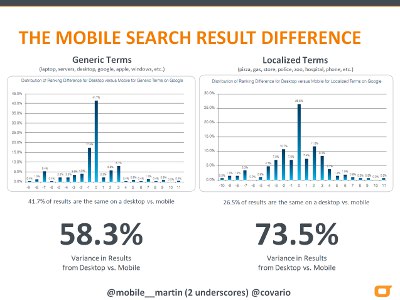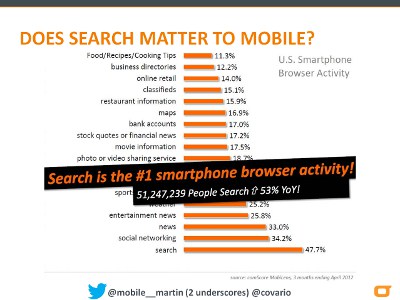4 Mobile Search Trends Tackled At SMX West 2013
The 2013 SMX West conference could have easily be confused as the first SMX Authorship show with extensive interest in and questions surrounding Google’s use of authorship and the prominence of those articles associated with verified authors. However, it was mobile that led the way with one of the first sessions of the conference being Trends in Mobile Search. […]
The 2013 SMX West conference could have easily be confused as the first SMX Authorship show with extensive interest in and questions surrounding Google’s use of authorship and the prominence of those articles associated with verified authors. However, it was mobile that led the way with one of the first sessions of the conference being Trends in Mobile Search.
The Trends in Mobile Search session was moderated by Search Engine Land’s Greg Sterling and included Raj Kapoor of Microsoft, Jason Lehmbeck of DataPop, Bryson Meunier of Resolution Media, and myself.
Raj and Jason presented on trends in mobile advertising with mobile use increasing in the evenings and weekends, and how best to leverage Google Enhanced campaigns as well Microsoft Mobile Ads.
Sandwiched in between was Bryson and myself, focusing on mobile organic search trends with methodologies and data.
First, before we talk about the current state of mobile search, I felt we should answer the question: is mobile really important?
Does Mobile Search Really Exist?
Steve Jobs stated back in 2010:
“…mobile device search hasn’t happened. Search is not where it’s at…”
Fast forward two years, and thanks in large part to Android’s dominance, Search is, in fact, the #1 mobile browser activity, according to comScore.
So, now we can affirm that search is a heavy activity on mobile devices; but, how much?
How Prominent Is Mobile Search?
As worldwide mobile Internet usage increases to just over 10% of total Internet use in 2012, mobile search has grown even faster to a quarter (25%) of all search. At Covario, we predict that by the end of 2013, a mobile device will be behind 1 out of every 3 searches.
We can see that mobile searching is happening and its increasing; but, isn’t it the same as desktop search?
Is There A Difference Between Mobile & Desktop Search Results?

What’s A Marketer To Do About These Mobile Search Trends?
Bryson Meunier and I then talked about our different Mobile SEO approaches with data points, and I dug into the advantages of HTML5 in mobile search and usability going forward.
Combining our strategies, a better Mobile SEO approach becomes very clear:
- Dynamic Serving Single URL or Separate URL strategy is best for device intent changes (e.g. services, commerce)
- Responsive Design Single URL for universal intent (e.g. information, news, blogs)
For example, if you are looking for news or information on a tablet, desktop, mobile, TV, etc., the intent is the same, as you just want those facts presented in a format that’s best for your device; thus, responsive design suffices.
Now, if you are searching for a service, say simply “banking,” on your phone, the intent and expectation is different than with a desktop. On your phone, you may be looking for the closest bank or ATM, while on a desktop, you could be looking for the best services or rates, thus a separate experience should be provided for these differing implied intents.
Contributing authors are invited to create content for Search Engine Land and are chosen for their expertise and contribution to the search community. Our contributors work under the oversight of the editorial staff and contributions are checked for quality and relevance to our readers. The opinions they express are their own.
Related stories
New on Search Engine Land

